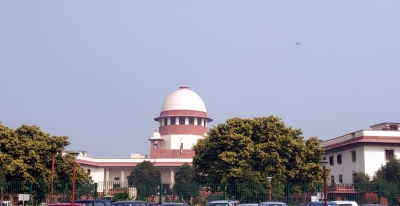New Delhi, Jan 17 : The Centre has told the Supreme Court that it was not possible to introduce changes in the guidelines issued for the disposal of dead bodies of Covid positive persons to address the grievances of the Parsi community.
The Union Ministry of Health and Welfare in an affidavit, said: “keeping the dead body exposed (without cover) without burial or cremation will not be a permissible way of disposal of dead bodies of Covid positive patients”.
The Centre’s response came on a plea seeking a traditional burial for the members of the Parsi community who died of Covid-19.Senior advocate Fali S.Nariman, representing the Surat Parsi Panchayat Board, had argued in the top court that the existing guidelines do not allow burial as per the Parsi community tradition, which involves professional pall bearers and exposing the body to nature for decay, and the community is unable to perform the traditional burial of people, who succumbed to Covid-19.
The affidavit added, “tThe dead bodies of such infectious patients are likely to get exposed to the environment and animals, if not buried or cremated properly.
The OIE (World Organization for Animal Health) has also observed that the people who are suspected or confirmed to be infected with the Covid-19 virus should minimise close direct contact with animals, including wildlife”.
The government said the OIE has also noted that there are valid concerns about the establishment of SARS-CoV-2 reservoirs in wild or domestic animals, which could pose a continued public health risk and lead to future spillover events to humans.”The virus introduction to a new animal species from a dead body might accelerate its evolution, which could potentially impact on surveillance and control strategies”, it added.
The Centre said that appropriate handling of dead bodies of Covid positive patients, therefore, remains critical from the public health perspective.It further added that the basic element of guidelines is that the dead body will be fully covered and not exposed so that people who are handling the dead body, which may or may not include family members, must not come in contact with bodily fluids or secretions.”Coronavirus, according to scientific evidence that has emerged so far, can survive on a dead body, in bodily fluids, secretions and moist cells of the dead body for up to 9 days.A dead body will be considered as an inanimate surface and secretions from orifices will carry infected cells and will remain smeared on the body surfaces after death”, said the affidavit.
The top court is likely to take up the matter later in the day.
On January 10, a bench headed by Justice D.Y.Chandrachud had asked the Solicitor General Tushar Mehta to engage with the concerned authorities to address the grievances of the Parsi community.
ss/dpb
#modify #Covid #Parsi #community #told #Delhi #Jan #Ali #Carry #Delhi #New Delhi #Surat #Surat #Coronavirus #Covid-19
.






